Movie Review – Batman, The
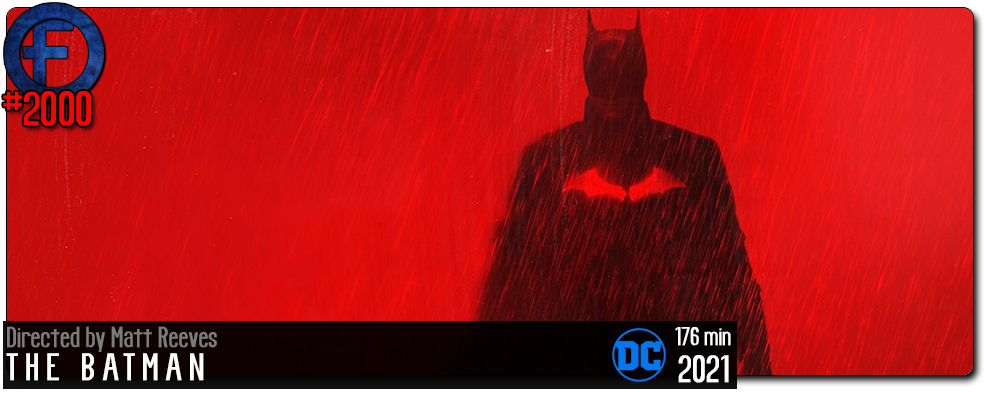
Principal Cast : Robert Pattinson, Zoe Kravitz, Paul Dano, Jeffrey Wright, John Turturro, Peter Sarsgaard, Andy Serkis, Colin Farrell, Jayme Lawson, Gil Perez-Abraham, Peter McDonald, Alex Ferns, Con O’Neill, Rupert Penry-Jones, Charlie Carver, Max Carver, Hana Hrzic.
Synopsis: When the Riddler, a sadistic serial killer, begins murdering key political figures in Gotham, Batman is forced to investigate the city’s hidden corruption and question his family’s involvement.
********
Minor spoilers within. Proceed with caution.
Whether he’s trouncing 1960’s camp television, battling Tim Burton’s atmospheric visual aesthetics, or castigating nipples on a Batsuit, DC Comic’s premiere superhero franchise, Batman, has had its ups and downs over the decades since his creation in 1939. Alongside Superman and Wonder Woman, Batman is one of DC’s most identifiable figures, and in terms of Hollywood money easily one if its most profitable. With Ben Affleck effectively out of the role following the lukewarm response to the ill-fated Joss Whedon Justice League, Warner Bros tapped War For The Planet of The Apes director Matt Reeves to usher in a new era for the Caped Crusader, aligning him with actor Robert Pattinson in the title role, and effectively gave them both the keys to the kingdom to make whatever kind of Batman movie they wanted. What Reeves and his collaborators have delivered is quite simply the definitive “World’s Greatest Detective” Batman, a deadpan noir masterpiece of comic-book perfection, and arguably the greatest Batman movie ever made.
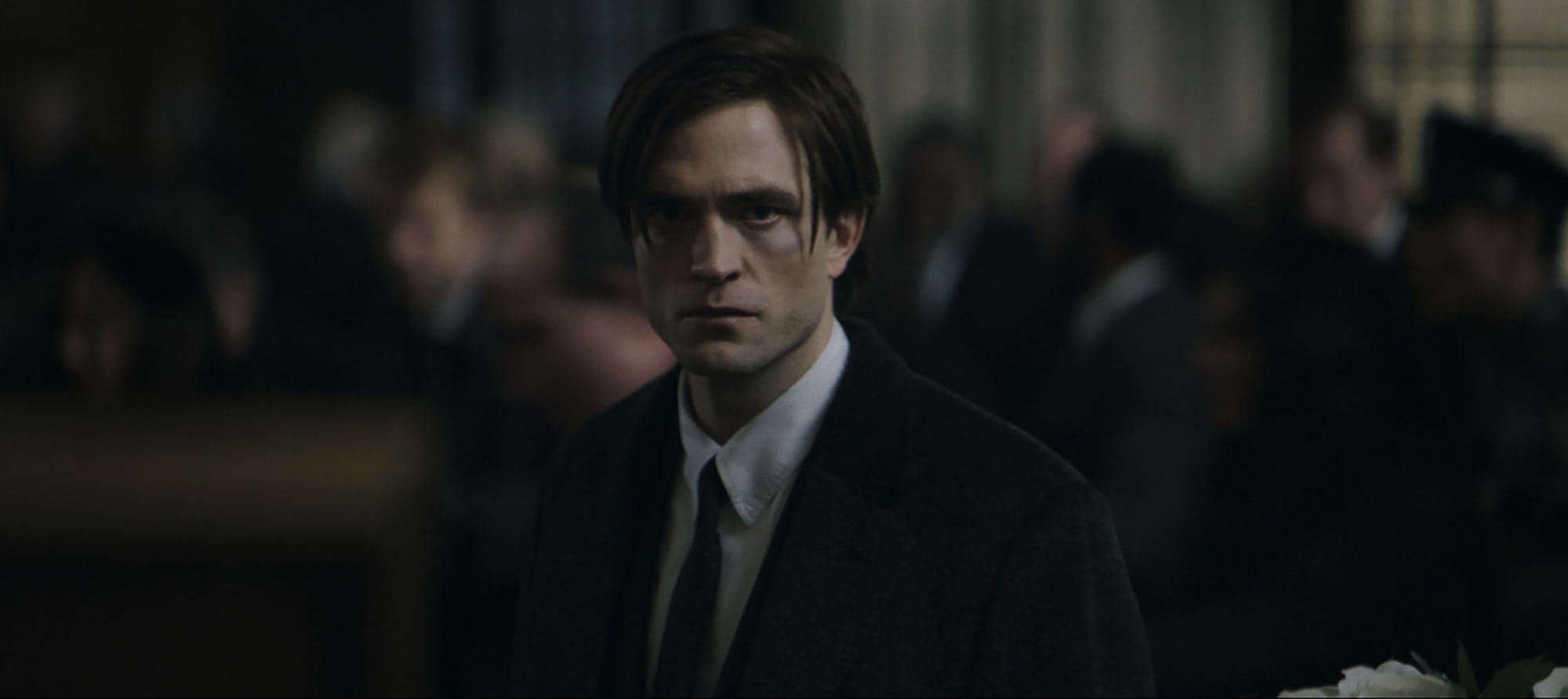
A young Bruce Wayne (Robert Pattinson) masquerades as the masked vigilante known as Batman in Gotham City, a corrupt, corpulent city of vice and decay, alongside upright and honest CGPD Detective Gordon (Jeffrey Wright), trying to crack the case of the mysterious serial killer known only as The Riddler (Paul Dano). Leaving clues to his crimes, the Riddler has been killing various Gotham City elites, from the mayor to the police commissioner and even targeting Bruce himself. Their only lead: Selina Kyle (Zoe Kravitz), a cat burglar with links to shadowy underworld figures Oswald Cobblepot (Colin Farrell), a disfigured mafioso underboss, and Camine Falcone (John Turturro), the city’s de-facto Godfather, both of whom lead the tsunami of corruption gripping the city.
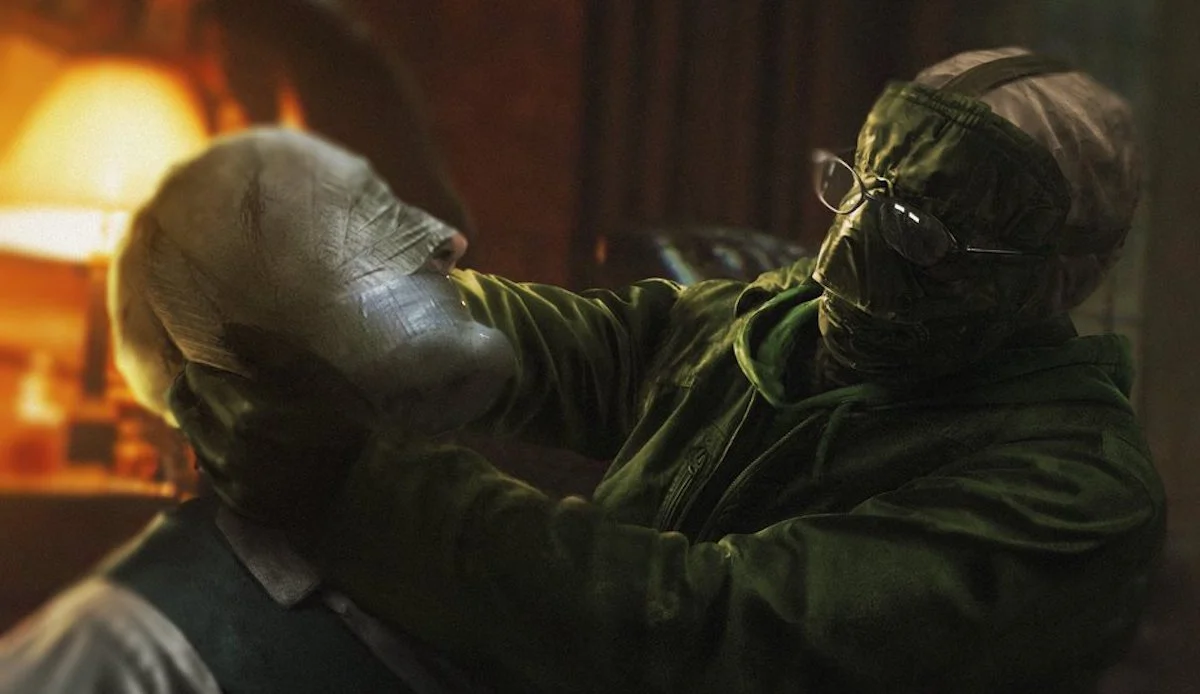
In the comics, Batman has become known as the Justice League’s master strategist and tactician, an incredible technologist and one of the smartest people alive. The detective aspect of Batman, long a staple for both the ongoing comics and a variety of stand-alones and mini-series, from which The Batman derives a lot of its inspiration, has rarely been seen so comprehensively depicted, with both Warner Brothers and the filmmakers tasked with directing his outings focusing more heavily on the physicality and rogues gallery the franchise has developed. This isn’t a criticism so much as an observation: Batman’s influence over comics cannot be understated, nor can the hugely different takes on the character down through the decades. From Frank Miller’s oft-cited “The Dark Knight Returns”, the hugely successful Jeph Loeb and Tim Sale miniseries “The Long Halloween” and the Loeb-scribed “Hush” (with artist Jim Lee), the various visions of Batman have ranged from pulp escapism, alternative reality realism to outright horror, and this has been reflected in Batman’s appearances in popular media as well. Everyone remembers the flashy, campy Adam West Batman television series from the ’60’s, the blockbusting success of Tim Burton’s 1989 Batman, Joel Schumacher’s fluorescent hodgepodge duo of films, and Christopher Nolan’s cave diving, Joker-punching Bruce Wayne of the Oughts; they’re all aspects of Batman explored through the veneer of popular culture of the day, but they are all vastly different.
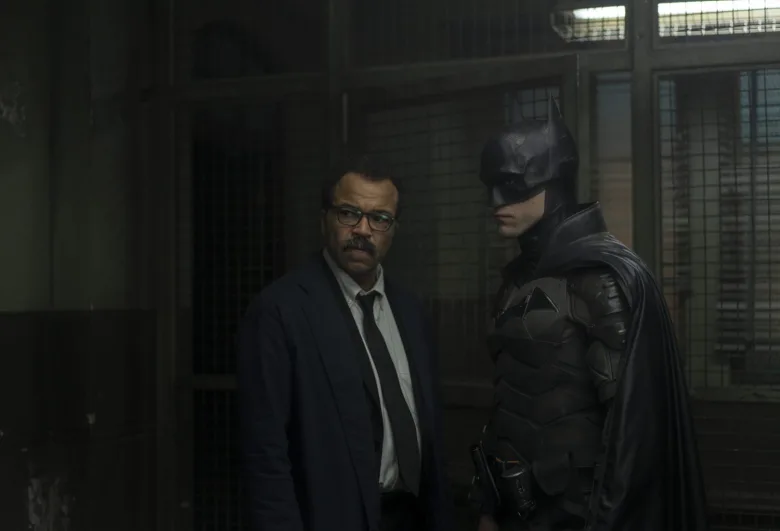
We’ve yet to see – until now, that is – a fully formed Batman in one of his more prominent aspects, however. Batman has long been considered one of literary fiction’s greatest detectives, alongside Agatha Christie’s Hercule Poirot or Conan Doyle’s Sherlock Holmes as a crime-fighting wunderkind. Whereas Superman and Wonder Woman often have only enhanced strength or alien powers to save the day, Batman, being entirely human, has transformed both his body and brain into highly potent weapons against evil. We’ve all seen Batman physically dominate an enemy, but rarely have wide audiences ever seen him out-think them. The Batman, Matt Reeves’ dark noir take on the character, delivers exactly the detective version of Batman I’ve always had in my mind’s eye since I started reading his comics back in the 1980’s. Reeves’ Batman steps into crime scenes alongside Gordon and the rest of the Gotham Police Department, scours the scene, eyeballs clues and deducts logical, scientific reasoning behind them before moving onto the next move. He uses tech, uses other people, uses psychology and mind-games to get the results he needs to solve the Riddler’s dark puzzles, and most importantly uses fear as a weapon against his enemies. This is indeed a gloriously comic-accurate portrayal of Batman as a detective and puzzle-solver first, haunted, tragic orphan kid second.
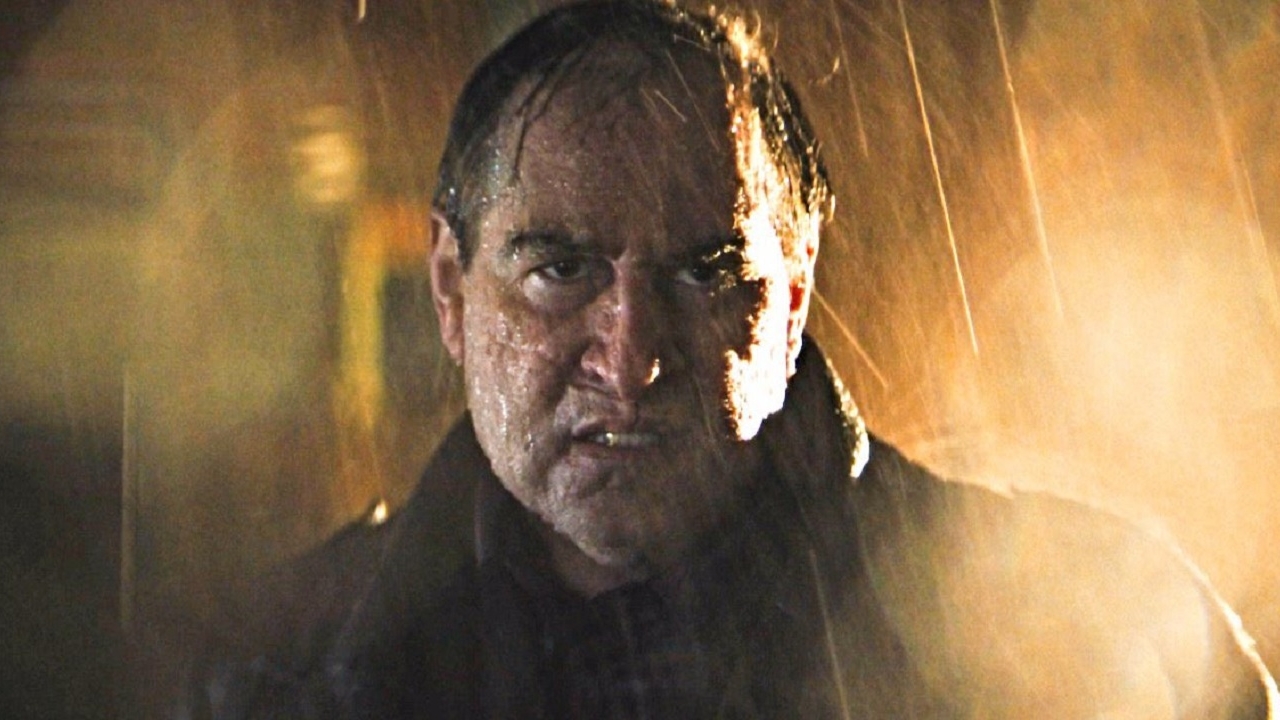
The Batman offers audiences a glimpse into a truly broken individual. Bruce Wayne is afflicted by the guilt and trauma of his parents’ murder years before – the film never shows it, because we all know it – and he struggles to emerge from the spiral of rage and depression at any point in this film. Pattinson’s Batman is still largely in his formative years, with Reeves on record as saying this is “Year Two” for the character at this point in the story; this Batman makes mistakes, often overestimates his abilities, and doesn’t always know what he’s doing, although he is absolutely sure of one thing, and that’s striking fear into the hoodlums and criminals of his beloved city. Exactly why Bruce wants to stick around in Gotham puzzled me at first, for as presented in The Batman the city is an absolute cesspit of dank despair, rampant criminality and corruption, and a significant lack of hope. Why Bruce wouldn’t just upend himself and go sit on a tropical beach with all his money, I’ll never know. Bruce’s relationship with his trusty manservant, Alfred Pennyworth, is one of borderline psychosis, with the former Special Forces operative doing his best mentorship of the young vigilante seemingly without a shred of thanks or affection. So too Bruce’s eventual relationship with Selina Kyle, both orphans of sorts seeking redemption throughout, and in the case of Kravitz’ Catwoman, a way out of Gotham. Pattinson and Kravitz have a nice chemistry together, although in terms of pure emotional heft I have to say the Cat certainly one-ups the Bat.
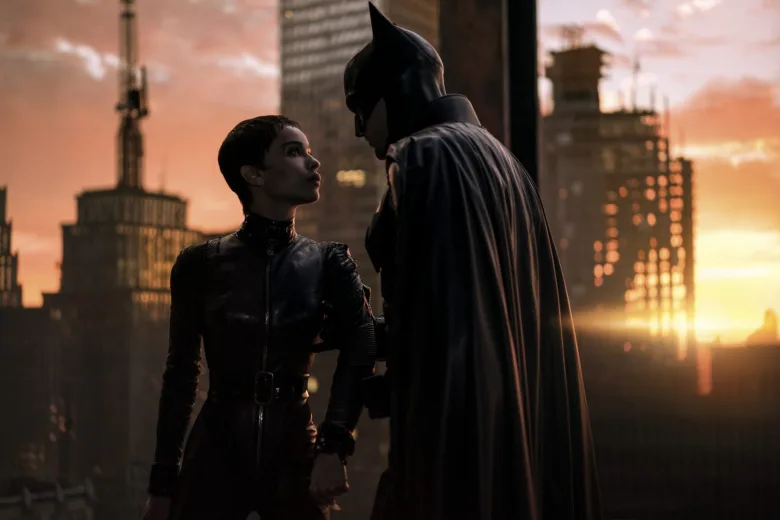
Gotham itself is a character in the film wholeheartedly. It’s perpetually dark, and drizzled with non-stop rain, with an omnipresent dour tone matched only by the dangerous machinations of Dano’s Riddler, a masked and cackling maniac at the end of numerous low-fi terrorist videos. I’m not sure why the film chooses to perpetuate the idea that terrorists can’t shoot videos of themselves with the quality set to HD, but it does. Light, or the absence of it, plays a significant part of the film’s brooding, heavy-set aesthetic, with every inch of the frame blasted in water-soaked refraction and dingy, desolate darkness. It’s a film in which light struggles to overcome the darkness, as close to a quantifiable on-screen scientific representation as I’ve seen depicted on film; had this film been shot in black and white, it could easily have been released in the 1940’s and nobody would have batted an eye, it’s so vigorously unrelenting. A true noir detective film with a little bit of Batman. Hell, even the opening voiceover monologue is reminiscent of the great crime flicks of Hollywood’s golden age, a sourpuss detective reciting the time, the place, and why he’s suddenly taken to the whiskey. It’s a thematic device used in the Loeb comics from which this takes inspiration, and it works beautifully.
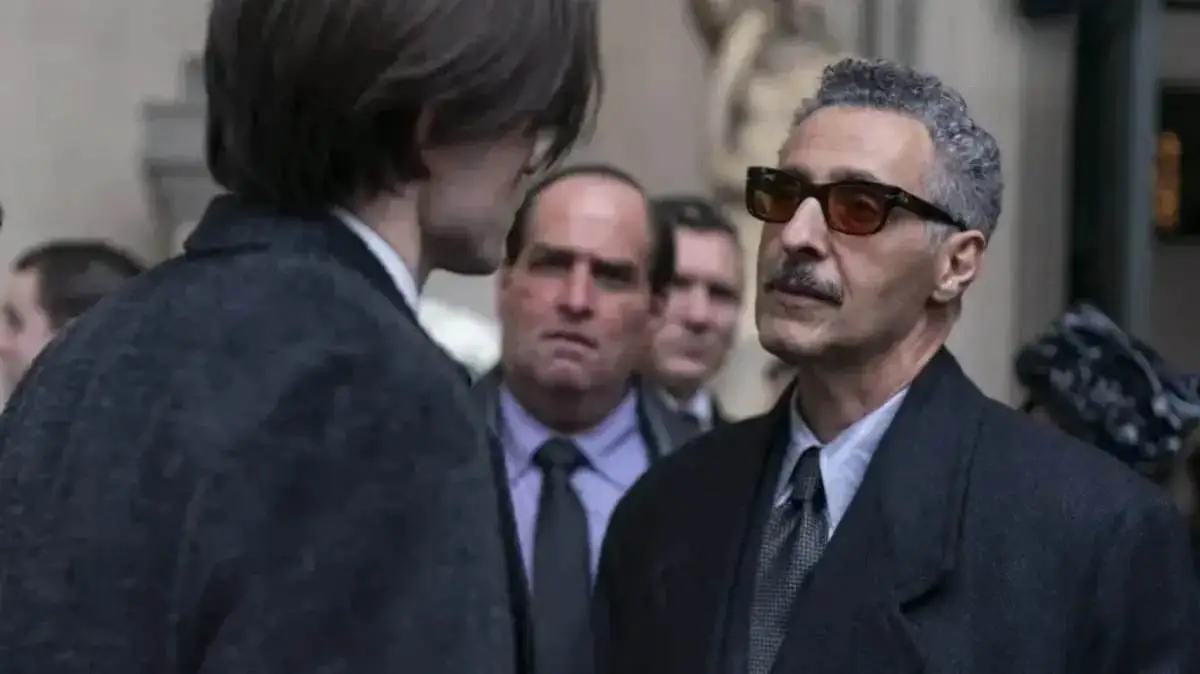
Reeves’ treats his Batman as a true force of nature. Pattinson’s first real on-screen appearance, glimpsed in the film’s trailers, is in a subway tunnel facing down a gang of white-faced hoods. As Batman emerges from the darkness, his footsteps are accompanied by a low frequency thud as well as the smallest of jangles, almost like cowboy spurs, the motif of justice coming to the old west not lost on anyone. Batman isn’t afraid to get his bat-gloves bloody either, as his bruising, bone-breaking and muscle-shredding style of combat sees plenty of bad guys pummeled and destroyed to within an inch of their lives. Unrestrained as he is, Batman walks the tightrope of “no killing” and “if they die, they die” vigilantism, something truly espoused by the Zack Snyder Batman of Ben Affleck’s tenure and continued on here: at one point, Batman pursues the Penguin, played by an unrecognizable Colin Farrell, using his muscle-car Batmobile, ending the chase with a violent and possibly death-inducing vehicle rollover, an outcome I doubt was intended but certainly plausible, recognizing that Batman will use any means required to obtain the information or outcome he needs to. A lot of what we see if enormously utilitarian: the Batcave feels more like a bat infested train tunnel than an actual cavern, the Batmobile is a jumped up throwback from the Fast & Furious franchise, and Batman’s computer tech is that weird anachronistic sideways feeling style similar to that seen in The Incredibles or Megamind. Even Batman’s costume looks like it could take a direct hit from a tactical nuke. But it all fits within Reeves’ vision for both Gotham and the characters within it. It’s a 30’s vibe set in a modern day oppressive metropolis of decadence. And the Batman is the eponymous hero who must work within this milieu.
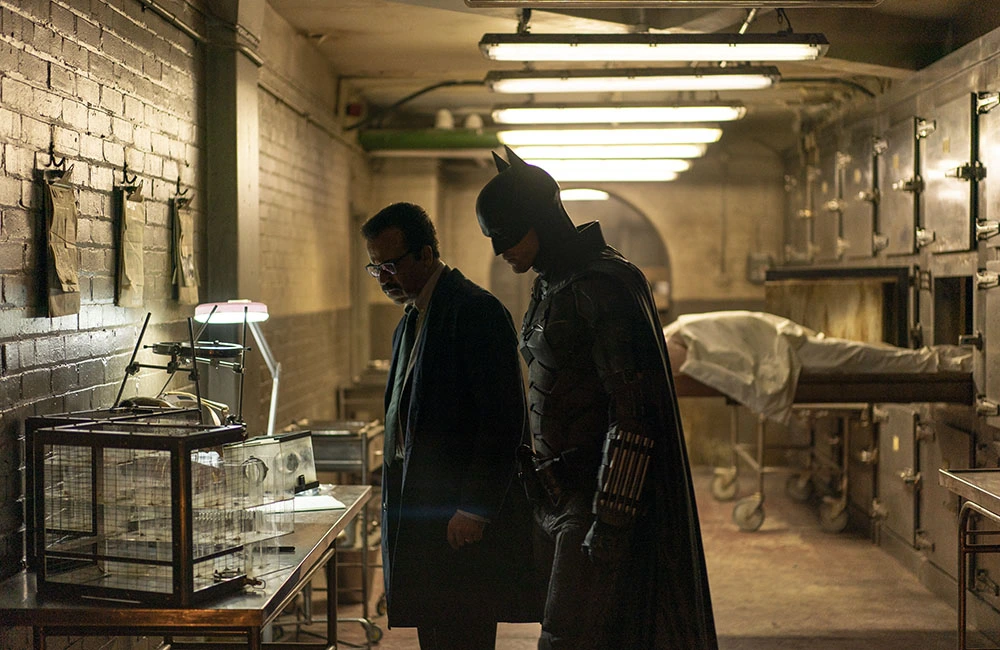
Augmenting the Pattinson/Kravitz duo of entanglement is Jeffrey Wright, as easily the best personification of Jim Gordon we’ve seen on screen to-date. Apologies to the wonderful Gary Oldman, but Wright’s stoic, deadpan Gordon and his relationship with Batman as partners, rather than unequal crime-fighters, is a revelation to the property’s feature film existence. Wright is patient, wry, taciturn and switched on, not reliant on Batman to save the day but recognizing the skills the vigilante has that Gordon himself is unable to cross into: Batman has a moral line further out than the police, so Gordon understands this dichotomy all too well. Wright’s Jim Gordon, never noted as “Commissioner” in this film at all, is perhaps the most fully fleshed of all takes on the character in live action. So too is Carmine Falcone, as essayed by John Turturro, an actor long mired in performative bullshit like Michael Bay’s Transformer franchise, legitimately reminding us all of how special an actor he is with such a memorable performance. Falcone was previously played by Tom Wilkinson in Batman Begins as a kind of physically imposing gangster; in The Batman, Turturro turns him into a real shadowy figure of fear – echoing Batman himself, in many ways – with reputational monstrousness preceding him throughout the city. Turturro’s understated performance works really well within Reeves’ version of Gotham, a snakelike weasel who’s made good but who rules with an iron fist.
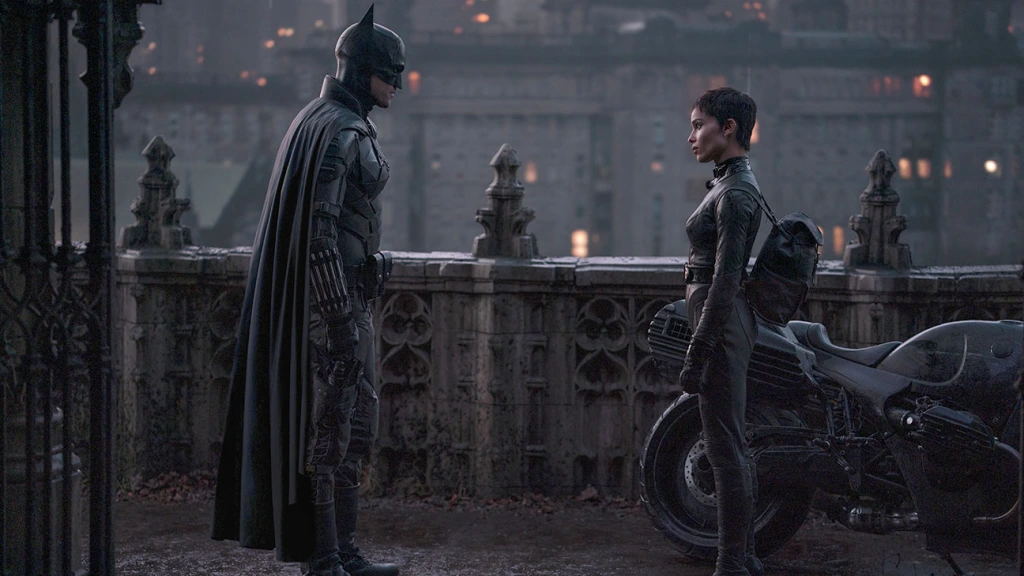
In terms of central villain, in a film filled with them, Paul Dano’s Riddler is a standout. Creepy, sinister and twisted, he feels less like the caterwauling joke of a character popularized by Jim Carrey or Frank Gorshin and more like something out of David Fincher’s nightmares. The riddles he leaves Batman throughout, as he instigates his murderous crime spree, are clever but far too easily solved by the caped crusader, although to be fair Batman always seems to be three steps behind in solving the case as the body count mounts. Dano’s to-camera rantings to his online fan club are far too close to home for my liking, echoing similar incel statements you see almost every day on the web. Unfortunately, we don’t get to see enough of Dano’s face throughout the film to really cement him as an all-time great villain – he’s certainly a long way from Heath Ledger’s Joker, if you want a comparison – and I was frustrated by the film’s refusal to let us into Edward Nashton’s mind from an intimate perspective. Fans of Batman will sigh with relief that we finally have a legitimately threatening version of the classic character, though.
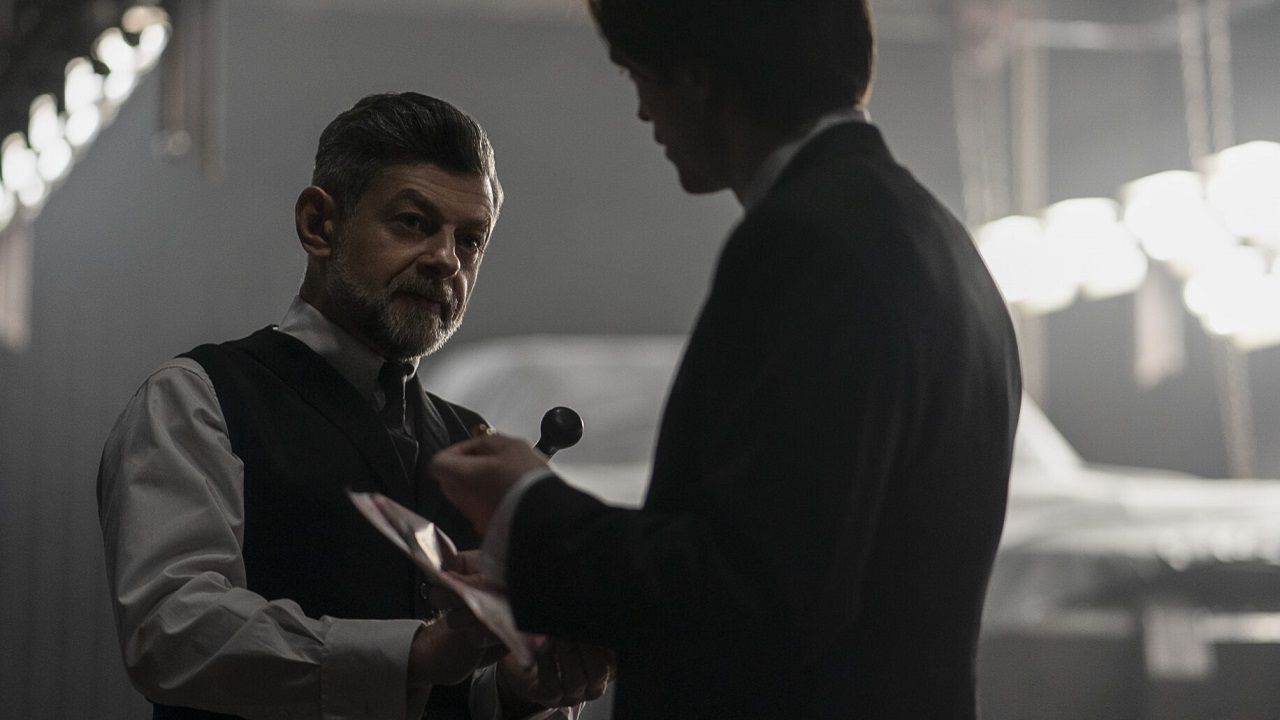
And the music. Oh, the music. Michael Giocchino’s score, a throbbing, devastating work of orchestration and manifesting brute-force energy, is immediately an all-time great. Honestly, I didn’t think much of Hans Zimmer’s Batman themes back in the day but over time they grew on me (I was still too close to Danny Elfman’s ’89 melody at the time); here, Giacchino works magic to give this bruising, desperately bleak Batman a musical theme to savour: the score flits between the repeated trumpetous riff and a variety of Schubert’s “Ave Maria”, sprinkling melancholy piano and tremulously creepy string sections into a musical motif that will last with your for days. I’ve been listening to the score from this film on repeat since I saw it, and I’ve grown to love it even more. Somehow, and I know this trying to quantify the unquantifiable, but Giacchino’s score for The Batman just feels like a Batman score. Triumphant and menacing, it suits the film and the character to the ground.
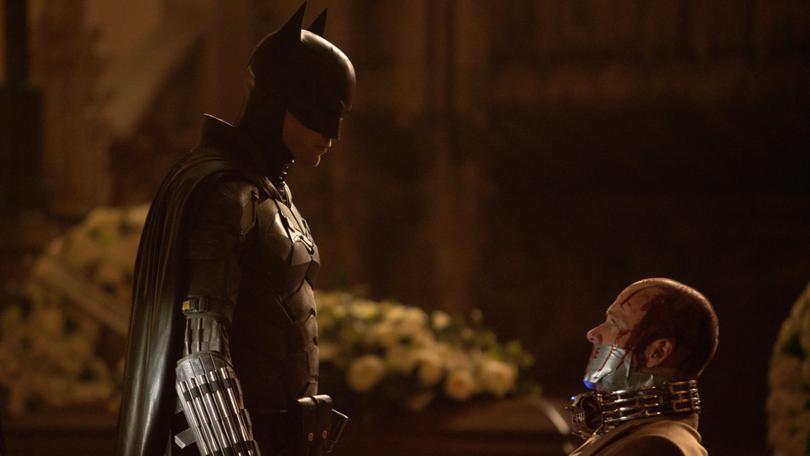
The Batman isn’t perfect, however, and there are a couple of caveats to the praise I’ve been heaping upon it for the last half-dozen paragraphs. For a start, it’s far too long. At three hours, the film is around an hour or so too protracted, particularly the nonsensical third act plot twist, more on which in a moment. While I understand Matt Reeves had to layer in so much nuance and depth to the characters and sprawling, ensemble storyline, there are moments that could have been tightened up editorially, or removed altogether. Don’t mistake me: I enjoyed the film immensely, but sitting down to rewatch this for the fourth or fifth time is going to be challenging, no matter how much I rave about it. The second thing, and this hooks into the first easily enough, is the third act plot twist. In it (and I’ll try to be as vague as I can), the Riddler’s final plan comes to fruition and Batman must leap into action in a fairly generic, standardised action way, in what I can only describe as a ubiquitous comic-book movie frenzy of action and gigantic stakes. Character development and story kind fall by the wayside with this sloppy climactic sequence, reverting to tropes and hackneyed storytelling devices (and plenty of near-miss gotchas) that undercut the seriousness and well developed first few hours of the movie. If they’d ended the film at the beginning of what turns into the third act, The Batman would have damn near been an unqualified masterpiece. With the third act in place as-is, The Batman is merely a masterpiece of a Batman movie.
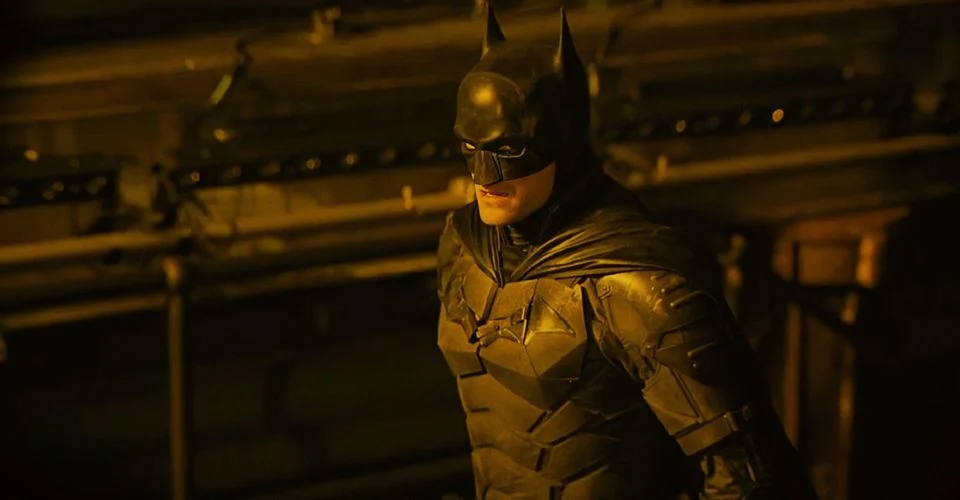
I’d be lying if I said this film wasn’t great. It is great, and a testament to what an auteur with a vision can bring to established properties if given the budget and permission. It’s the kind of film you don’t watch, you experience, a satisfying crime thriller with vigilantism and sinister criminality at its heart. The writing is superb, the performances all brilliant, and the production design (pay particular attention to the sound design, revealing one of the most aggressive sound mixes of any film in recent memory) is spectacular; The Batman won’t be for everyone, though. It will likely lose appeal to those thinking it’ll be like the Burton era, or even the Nolan era – in truth, this is the start of a new Batman era, one I’m inclined to think will stand the test of time as a classic of the genre. Approach The Batman with the right frame of mind and you’ll be bowled over by its assured sense of style and visual acumen, and everything else is just cream on the cake. The Batman is the best Batman movie ever made, and the standout film of 2022 so far.
